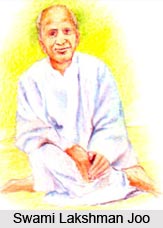 Swami Lakshman Joo was a well famous and renowned Yogi, who was born in Srinagar, Kashmir, in the year 1907. His father was Shri Narayandas Rainas and he had the credit of being the first man to have introduced houseboats in Kashmir. Swami Lakshman Joo showed his keen interest towards the higher life right from his early childhood and he had the habit of making `Shiva-linga` out of clay while playing with his friends. His father built a separate house for him so that he could easily do his Sadhana and teach the Shaiva texts to his followers and disciples.
Swami Lakshman Joo was a well famous and renowned Yogi, who was born in Srinagar, Kashmir, in the year 1907. His father was Shri Narayandas Rainas and he had the credit of being the first man to have introduced houseboats in Kashmir. Swami Lakshman Joo showed his keen interest towards the higher life right from his early childhood and he had the habit of making `Shiva-linga` out of clay while playing with his friends. His father built a separate house for him so that he could easily do his Sadhana and teach the Shaiva texts to his followers and disciples.
The interest of Swami Lakshman Joo towards spiritualism and higher life got stimulated greatly when he came under the influence of the famous saint, Swami Ram. The saint, Swami Ram gave Swami Lakshman Joo some lessons regarding japa of Gayatri Mantra as well as some yogic exercises according to the Shaiva discipline. Swami Lakshman Joo experienced self-realization for the first time, at a young age and he made a study of Saiva Sastras under the guidance of reputed scholar Mr. Nath Razdan, at a later period. He also founded an ashram, named `Isvara Ashram` for himself on a site between Nishat and Shalimar Gardens in the year of 1934.
Throughout his adult life he was involved in teaching Kashmirian Saiva texts. He translated into both Hindi and English the most important texts of his tradition.
This article is a stub. You can enrich by adding more information to it. Send your Write Up to content@indianetzone.com









